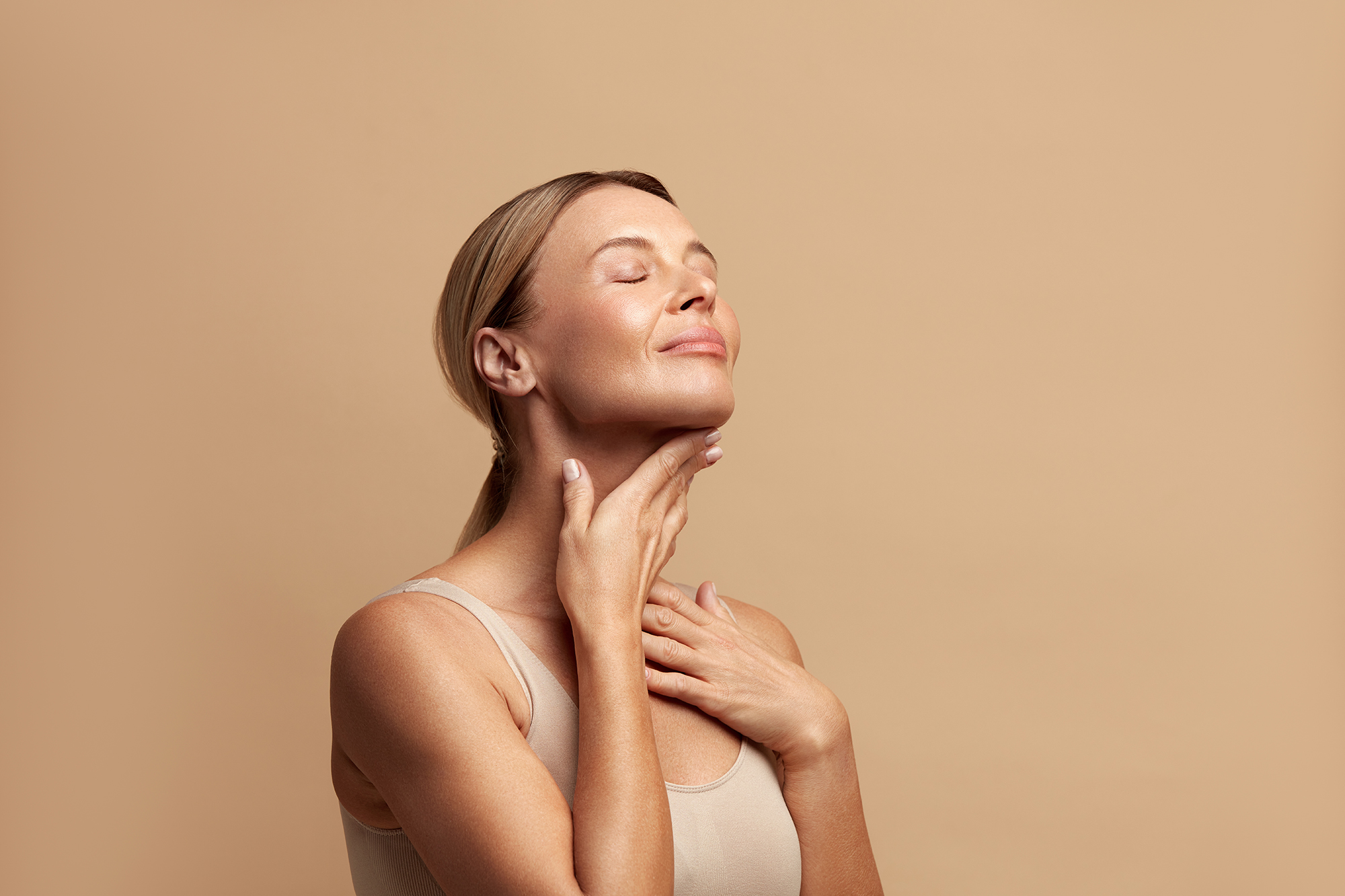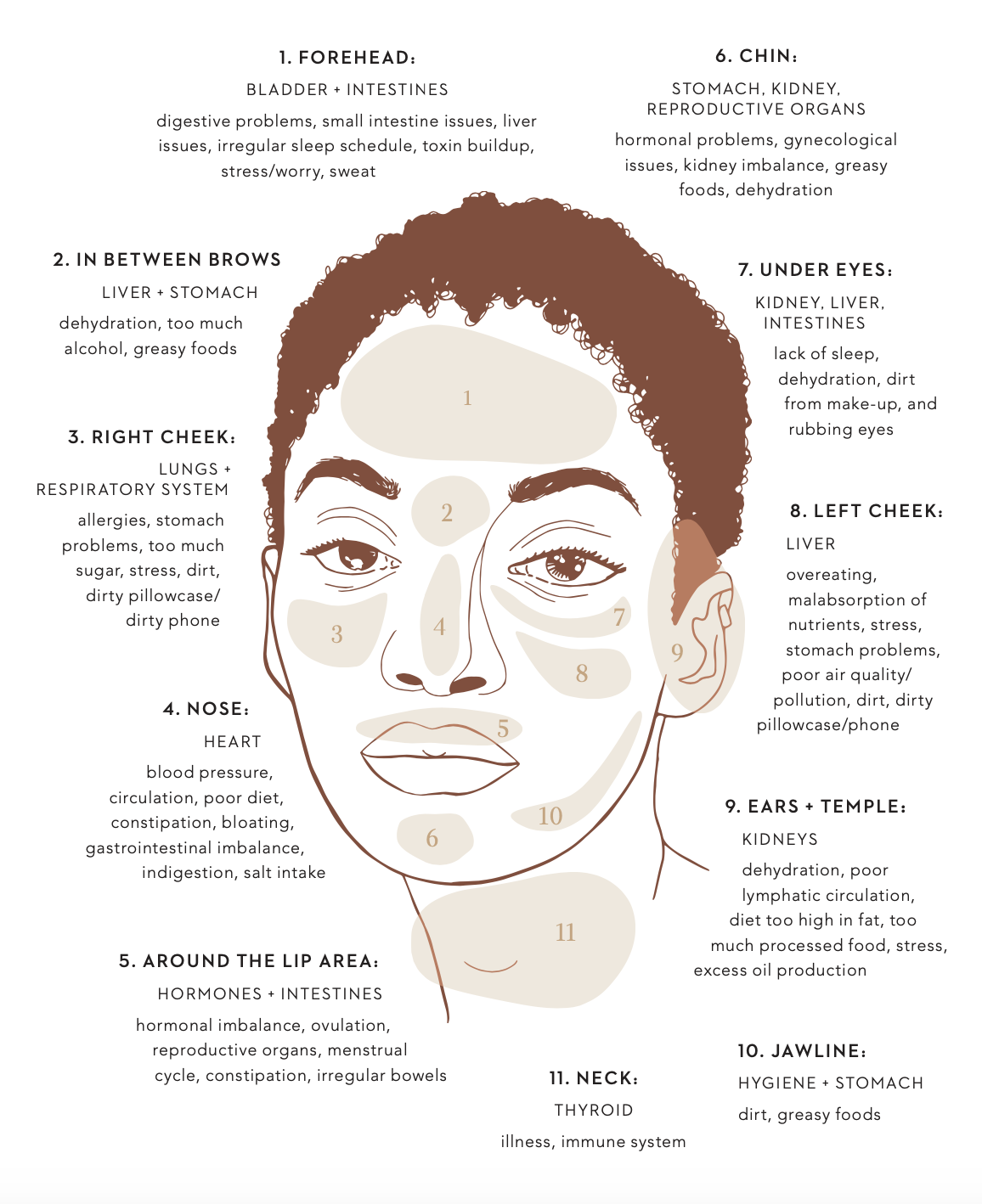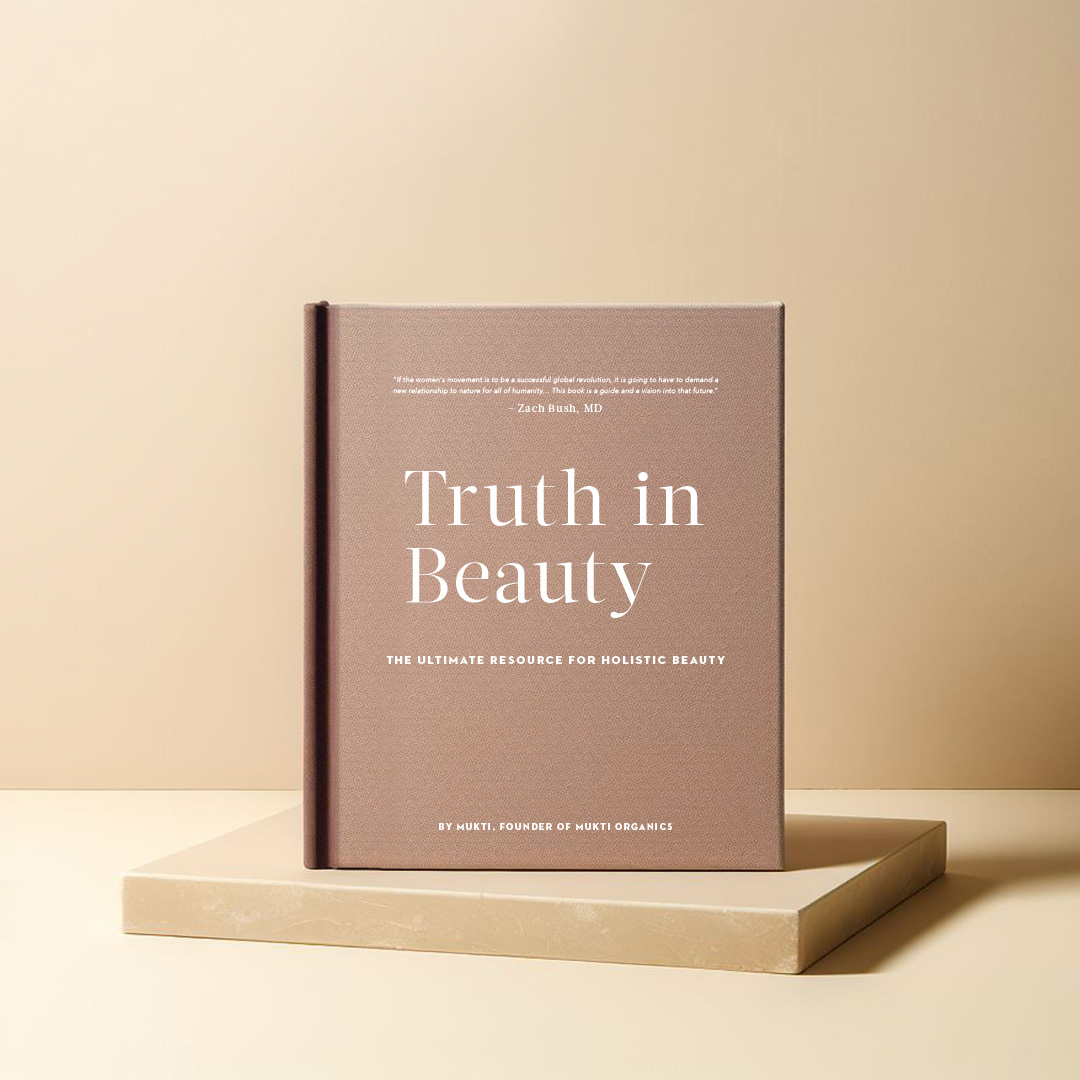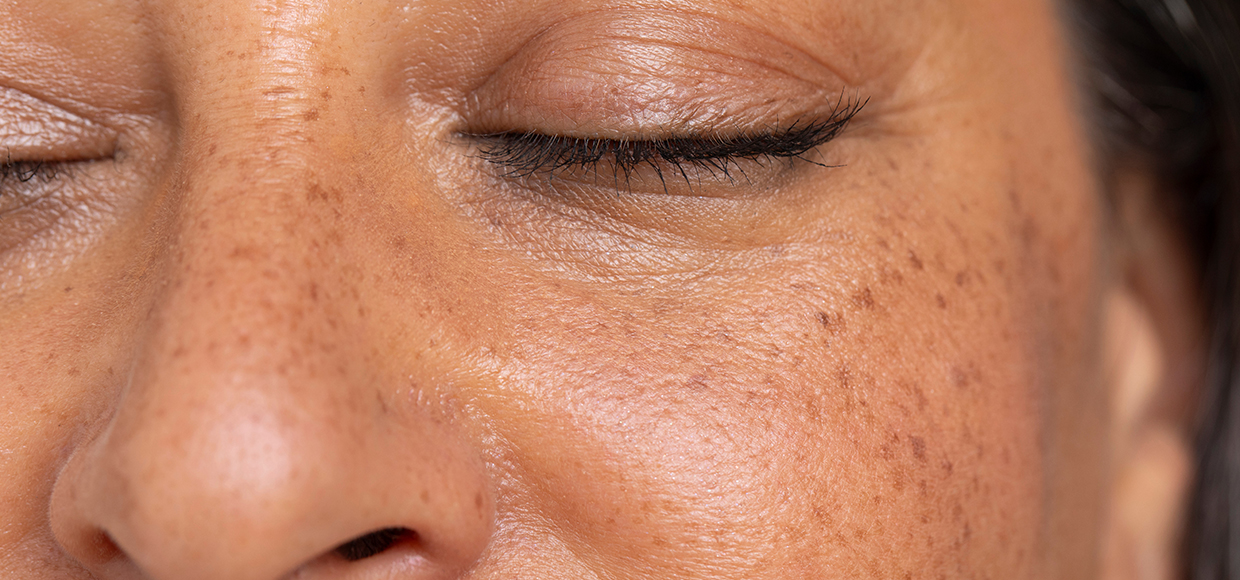You’re not alone if you feel like you’ve tried all the tricks, lotions and potions in the never-ending quest for radiant skin. Many of us have navigated the aisles of beauty products, searching for that elusive glow, only to find ourselves back at square one. Enter face mapping, a holistic approach that connects the dots between our skin’s condition and our overall health. This ancient practice offers insights into how specific areas of our face can reveal underlying physical and emotional issues, guiding us toward more targeted skincare solutions. Mukti, author of Truth in Beauty and founder of Mukti Organics explores how understanding the language of our skin can empower us to make informed choices about our beauty routines.

What is face mapping?
Face mapping, or face reading, stems from ancient Chinese and ayurvedic medicine.
It was traditionally used as a diagnostic tool for prominent leaders and scholars in the East. They believed the face represented the fortune, health, and energy of a person, and that by closely examining the condition of the skin and facial shape, you could investigate a person’s character, including their physical, mental, and emotional state. You could also have the necessary tools and requirements to change your fate and direction.
Face mapping and reading is a lot deeper than the skin and is more complex than just concerns about ageing.

How can we ‘read’ our faces?
The face is divided into three main zones – upper, middle, and lower. Any malfunctions within the organs and the systems — immune, excretory, endocrine, digestive, circulatory, nervous, and respiratory — will show up on the face in the form of breakouts, redness, dryness, or irritation.
It’s believed if the energy of a person was optimal, the skin would be clear and in good condition. Any malfunctioning or underlying illness would be reflected by a change
in colour, texture and appearance. Traditional interpretation may differ in how these areas are explained and which conditions are expressed. Below, we explain how the following areas might be linked to internal health indicators:
Forehead – bladder & intestines
The upper part of the forehead reflects the bladder, and the lower part, the intestines and digestion. Issues in this area could relate to constipation, irritable bowel syndrome, and urinary tract infections. It is important to seek medical advice for any health concerns, however if you’re looking to improve your general health in these areas, you could consider these tips:
- Change sleep cycle – this is optimal for your liver: ideally, go to bed regularly before 10pm and wake up early at around 6am
- Drink plenty of water to flush out toxins
- Eat more raw food and take prebiotics and probiotics – kimchi, sauerkraut, etc.
- Digestive enzymes may be required with meals
- Drink probiotics such as kombucha and kefir
- Chew food well to improve digestion
- Practice 30 minutes of light exercise every day – outdoors is particularly beneficial, Yin Yoga is ideal
- Practice relaxation or meditation techniques for 20 minutes each day
- Keep a daily food diary to see if breakouts relate to consumption of certain foods
- Make sure hair products are not irritating the hairline
- Eliminate or consume less alcohol
- Eliminate sugar and carbonated beverages
Ears & Temples – kidneys
Dehydration, poor lymphatic circulation. When the kidneys are involved, it indicates a deeper level of ageing and stress. A good place to start when it comes to nourishing the kidneys is with proper hydration. Some other tips can be:
- Drink plenty of water – add a squeeze of lime or lemon
- Make the salt switch from processed table salt to sea salt
- Include cooling foods in your diet like cucumbers and melon
- Practice better skin hygiene – cleanse regularly, especially during summer and when perspiring
- Eliminate processed food, fast food, and junk food
- Avoid cigarettes and alcohol
- Eliminate sweetened and caffeinated beverages
Between the brows – liver and stomach
Alcohol consumption, fatty liver diseases (like hepatitis and jaundice), gallbladder problems, and dehydration could reflect in this area. Acne can be the result of eating too late at night, especially heavy, fatty foods. Flaking and dry skin are linked to dehydration and overworked kidneys. The liver is working too hard to remove toxins from consumption and pollution. Some other practices you can try to enhance your health in these areas are:
- Exercise, but avoid overly strenuous exercise that can be heating
- Yoga and brisk walking are ideal
- Get plenty of fresh air
- Get adequate sleep – at least seven to eight hours
- Eat lighter foods and cut back on dairy and red meat
- Avoid late night snacks
- Avoid alcohol and cigarettes
Nose & Upper Cheek – heart and cardiovascular system
This area indicates exposure to air pollution and smoke, gum issues or inflammation
in the mouth or tooth sockets. Lower left cheek acne could represent dental health, so have your teeth professionally cleaned every six months and keep your gums and teeth healthy by flossing and brushing after you eat. While is important to seek medical advice for any serious health concerns, for general wellbeing, you can also consider these tips:
- Maintain a regular daily routine
- Keep a positive mood by practicing meditation and relaxation techniques for 20 minutes each day
- Eat more cooling foods such as cucumber, melons, and green beans
- The liver is the strongest from 1-3am, so this is when you should be sleeping
- The liver is weakest at 1-5pm so make your workload easier during this time
- Rest your eyes by palming them for five minutes every hour if you work in the afternoons
- Practice proper cleansing hygiene, especially if you live in a polluted city Use a toxin-free and fragrance-free laundry detergent
- Change pillowcases frequently and, ideally, sleep on a silk pillowcase
- Clean cell phones regularly
- Don’t overeat and avoid processed and junk foods
Right cheek – lungs & respiratory system
This area relates to issues with sinuses and allergies. Pollution, smoking, and asthma will damage this part of the skin. Get plenty of exercise, stay away from pollution and avoid smoking. Some other tips are:
- The lung meridian is stronger in the morning, so this is the ideal time for cardio exercise
- Drink lots of green vegetable juices including dark leafy greens, kale, cucumber, celery, etc.
- Drink lots of water with lemon
- Get more fresh air
- Use a toxin-free and fragrance-free laundry detergent
- Change pillowcases frequently and, ideally, sleep on a silk pillowcase
- Clean cell phones regularly
- Practice proper cleansing hygiene, especially if you live in a polluted city
- Avoid fast food and junk food and hydrogenated fats
- Avoid sugar, mango, taro root, wine, and seafood or other foods you may be sensitive to
Left cheek – liver & stomach
This area indicates exposure to air pollution and smoke, gum issues, or inflammation in the mouth or tooth sockets. Lower left cheek acne could represent dental health, so have your teeth professionally cleaned every six months and keep your gums and teeth healthy by flossing and brushing after you eat. Also try the following:
- Maintain a regular daily routine
- Keep a positive mood by practicing meditation and relaxation techniques for 20 minutes each day
- Eat more cooling foods such as cucumber, melons, and green beans
The liver is the strongest from 1-3am, so this is when you should be sleeping
- The liver is weakest at 1-5pm so make your workload easier during this time
- Rest your eyes by palming them for five minutes every hour if you work in the afternoons
- Practice proper cleansing hygiene, especially if you live in a polluted city
- Use a toxin-free and fragrance-free laundry detergent
- Change pillowcases frequently and, ideally, sleep on a silk pillowcase
- Clean cell phones regularly
- Don’t overeat and avoid processed and junk foods
Mouth & lip area – endocrine system
Breakouts in this area are associated with hormonal imbalances and issues. Menstrual problems or increased stress levels will trigger the release of cortisol. It is important to seek medical advice for any serious health concerns, however if you’re looking to improve your general health, you could consider these tips:
- Consider food sensitivities and toxic buildup
- Eat more fibre by including more fresh fruits and vegetables in your diet
- Massage the abdominal area in a clockwise motion
- Use a natural and organic toothpaste and lip balm
- Avoid spicy and fried foods
Jawline & chin – stomach, kidney & reproductive organs
Pimples in the middle of the chin are associated with the digestive system. Eating too much fat and sweet food can cause problems in this area, as well as excessive caffeine and alcohol consumption. Try to maintain a balanced diet and eat plenty of fruits and demulcent fibre (marshmallow, slippery elm, aloe vera) to improve stomach health. Also try:
- Reduce the habit of eating before bed
- Eat plenty of fibre from fresh fruit and vegetables
- Get adequate rest and nap during the day, if possible
- Reduce stress as much as possible by practicing yoga and meditation
- Get 20 minutes of exercise each day
- Sleep early, wake up early – get at least 7-8 hours of sleep each night
- Massage your body for relaxation, particularly the abdomen
- Practice proper hygiene
- Check toothpaste, mouthwash, and lip products
- Drink spearmint and peppermint tea
- Apply echinacea directly to the area
- Avoid hydrogenated fats and processed sugar
Neck – thyroid
Good cholesterol production from saturated fats is the precursor of your most important hormones. Eating the wrong foods, being under artificial lights and disconnected from nature can disturb healthy hormone levels and balance. While it is important to seek medical advice for any health concerns, you can improve your general wellbeing with these tips:
- Get fresh air and avoid artificial lights
- Eat grass-fed and -finished meat and avoid industrialised, hormone-injected meat
- Increase saturated fats like organic ghee, butter, and diary
- Drink adequate water
- Sun gazing every day in the early morning barefoot on the grass or sand is beneficial for grounding
- Get your hormones checked for imbalances
- Take an omega-3 supplement like Evening Primrose Oil; fish oils to help regulate hormones
- Take vitamin D if you aren’t getting adequate sunlight and magnesium supplements – both are needed for proper hormone function
- Avoid hormone-disrupting chemicals like phthalates (found in perfumes, washing powders, candles, and fragranced products)
This article is not intended to treat or diagnose any health or skin concerns. Please visit a suitable expert for any concerns in this area.
This is an edited excerpt from Mukti’s best-selling book Truth in Beauty. Truth in Beauty is an insider’s guide into the industry, helping readers to navigate the clean beauty movement and achieve a healthier lifestyle. This easy-to-follow companion is full of need-to-know information that exposes the harmful ingredients found in everyday skincare, cosmetics, and personal care products. www.muktiorganics.com








